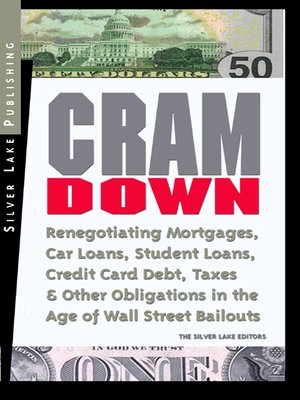CRAMDOWN
ebook ∣ Renegotiating Mortgages, Car Loans, Student Loans, Credit Card Debt, Taxes & Other Financial Obligations in the Age of Wall Street Bailouts
By Silver Lake Editors

Sign up to save your library
With an OverDrive account, you can save your favorite libraries for at-a-glance information about availability. Find out more about OverDrive accounts.
Find this title in Libby, the library reading app by OverDrive.



Search for a digital library with this title
Title found at these libraries:
| Library Name | Distance |
|---|---|
| Loading... |
Why is the loan mod process so difficult? Here are some points to keep in mind:
• Mortgage banking jargon can be difficult (and this is at least partly by design). For example, some banks and loan servicing companies use the term “loss mitigation” instead of “loan modification.” If the homeowner doesn’t know this, he or she can get lost in a bureaucratic maze of telephone calls forwarded to the wrong offices.
• Some consumers confuse a loan modification with a forbearance agreement. These are two separate types of agreements. A loan modification is a permanent change to the loan, based on the borrower’s proven inability to repay under existing terms and conditions. A forbearance agreement is temporary relief, usually in the form of payments suspended for a few months.
• The standard telephone-based communications between borrowers and lenders or servicers is not designed for efficiency. Most borrowers have to spend hours navigating through automated systems and “phone trees” (usually during business hours only), explaining their situations repeatedly. This can be discouraging. Constant follow-up is usually required—as well as repeated sending of applications and documents.
All of these factors combine for a troubling final statistic: Fewer than 10 percent of homeowner-submitted loan modifications are successful. The mortgage industry insists this is due primarily to homeowners submitting incomplete loan modification packages. So, borrowers need to make sure they submit complete applications. CRAMDOWN shows them how.
The book starts with Edward Liddy’s efforts in late 2008 and early 2009 to renegotiate the terms of the financial bailout that AIG had received from the U.S. federal government. The editors go on to write:
You shouldn’t be angry about Liddy’s shameless bid to change the terms of deals his company had made. You should learn from it. Finance—even personal finance—isn’t about shame or other moral matters. It’s about practical matters of money. Who has it…and who needs it.
The title of this book is CRAMDOWN—and it’s a word that has been getting a lot of use in the last few years. Strictly speaking, cramdown refers to the process of having a plan for reorganization confirmed over the objections of creditors in a bankruptcy proceeding. But the word has come to mean more than merely that. … We live in the era of the renegotiated contract. You can complain about this—or you can adapt and take advantage of the new rules of the financial game.







